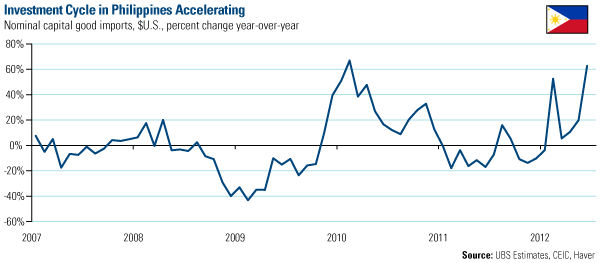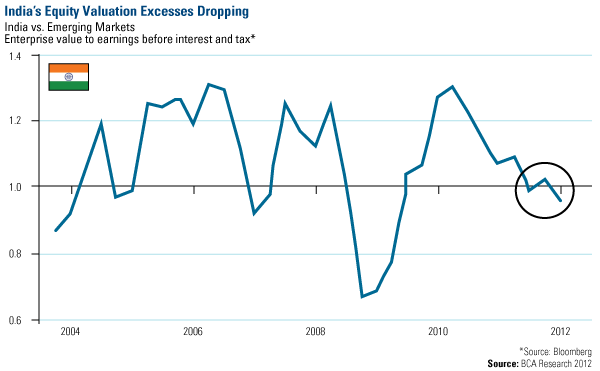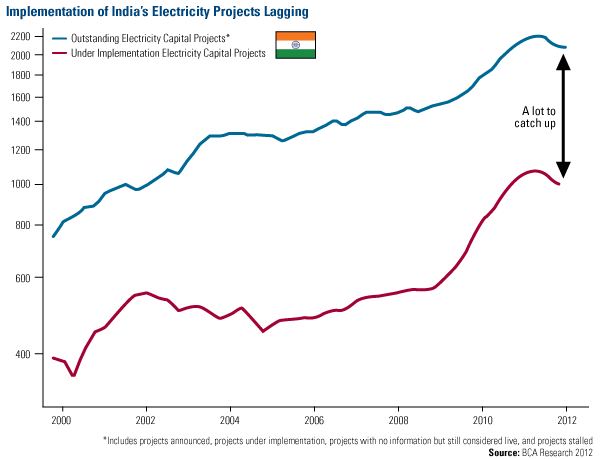Emerging Markets Radar (September 2, 2o12)
Strengths
- Central Huijin Investment, China’s government wealth management entity, picked up more A-shares of Industrial and Commercial Bank of China, China Construction Bank, Bank of China and Agricultural Bank of China in the second quarter, in hopes of boosting the market sentiment in China as regulators also called on companies to buy back their shares as their share price approaches book value.
- China’s third-quarter economy may rebound and be “slightly” higher than the second quarter as stable growth policies start to take effect, Xinhua reported, citing Hou Yunchun, a researcher at the State Council’s State Development Research Center.
- China will overtake the U.S. as the world’s largest smartphone market this year. China will account for 26.5 percent of smartphone shipments in 2012, compared with 17.8 percent for the U.S., research firm IDC said.
Weaknesses
- About 2,453 publicly listed Chinese companies combined first-half profits falling 0.38 percent with no growth on a year-over-year basis, China Securities Journal said. For the second half of the year, Bank of America Merrill Lynch Global Research and CICC believe corporate earnings growth could accelerate as they think China will step up easing policies.
- High commodity prices have played a significant role in depressing Indian equities’ price performance. Lower commodity prices will help stabilize India’s relative performance against other emerging markets because they will at the margin boost profit margins as well as domestic liquidity, according to BCA.
- Thailand’s July exports fell 4.46 percent, lower than the consensus of -3.8 percent, but imports surged 13.7 percent on a year-over-year basis, resulting in a widening trade deficit of $1.75 billion.
Opportunities
- Here is a case in point that government policy is a precursor to change. In the Philippines, both monetary and fiscal policies are in favor of property and construction and consumer income growth, as the country is cutting interest rates and allocating the budget toward building infrastructure in the country. The chart below shows capital goods imports increased, an indication that construction is booming.

- Indian relative equity valuations are no longer excessive given that India’s return on equity and return on assets exceed, and will likely remain, above those of emerging markets counterparts, maintains BCA Research.

- Now that anti-corruption allegations have largely subsided, BCA Research expects the Indian government to approve a pipeline of pending projects. After a prolonged and messy hold up, this is not only positive for India’s power problems, but also for the nation’s banks, which have a sizable exposure to the power industry.

Threats
- Indonesia’s current account deficit widened to 3.1 percent GDP in the first half of the year as export commodity prices fell, while the domestic economy and consumptions were booming. Directly impacted by current account deficit, Indonesia’s currency was weakened, which, though not a structural issue, caused some market volatility lately.
- On the heels of the Republican convention, a Citibank strategist opined that a victory for Romney could drive the Russian equity market down by 5 to 10 percent. Romney’s foreign policy stance differs in two key areas that could damage the Russian market: 1) the ‘number one geopolitical foe’ rhetoric would elicit an equal and opposite reaction; and 2) a greater push for U.S. energy independence has important consequences for global oil markets.
- On the other hand, Romney’s foreign policy platform would bolster relationships with traditional bulwarks against aggressive behavior on the part of Russia, such as Poland and Turkey. He plans to decrease European energy reliance on Russia by helping to speed up development of shale gas in Poland. He would also aim to free Central Asian gas with construction of the Nabucco pipeline through Georgia and Turkey.













